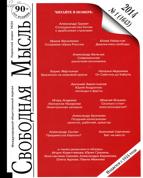Начну с постановки ключевой проблемы: как, исходя из марксистского анализа, ответить на некоторые принципиальные вопросы, касающиеся социальной структуры позднего капитализма и положения человека в этой системе? В методологическом плане необходимо обратить внимание на феномен не только меж-, но и внутриклассовых противоречий.
Late Capitalism: Capital, Worker, Creator. Eight Thesis towards the Problem of Social Structure of Late Capitalism and Its Contradictions
The central problem of the article is analysis of the social structure of late capitalism. Author accept well-known thesis, that now world capitalist system made industrial working class the biggest social strata, but He argues, that subject of the modern and future struggle for social liberation is class of “ordinary crea-tors” — employees working in the sphere of mass creative labor: education, health care, culture, science, recreation of nature and society. This social force together with the traditional working class is main opponent of not simply capitalist class, but first of all global corporative “nomenclatura” and so called “creative class”, which consists mainly from “professionals” working in “useless sector” — fictitious and parasitic part of finance, production of different simulacra and so on.
 Ранний опыт государственного строительства большевиков и Конституция РСФСР 1918 года
Ранний опыт государственного строительства большевиков и Конституция РСФСР 1918 года
 7
7
 25458
|
Официальные извинения
25458
|
Официальные извинения
 972
972
 106231
|
Становление корпоративизма в современной России. Угрозы и возможности
106231
|
Становление корпоративизма в современной России. Угрозы и возможности
 239
239
 85138
85138

